The French-farmer siege of Paris ended late last week, with farmers achieving key concessions from the French government on several farming issues.
The French prime minister scrapped plans to increase the tax on green diesel, promised better import controls and vowed to accelerate CAP payments to farmers.
The European Commission also moved, introducing a one-year derogation to the rules around fallow land.
The protests across France were one of hundreds that took place across the EU in recent weeks and months.
Farmers blocked key arteries across Europe to protest against the over-regulation of their sector, Ukrainian imports, red tape and taxes, among other more regional issues.
The protest action has taken place from one end of the EU to the other – from Ireland to Bulgaria.
Ban
Protests continue to take place in Latvia this week, with thousands calling for a ban on Russian and Belarusian imports into the EU, and in Bulgaria, Greece and Spain.
Germany:
Berlin at a standstill
Germany was the first EU country to stage large-scale farmer protests this year. For a week at the beginning of January, German farmers brought roads and cities, including central Berlin, to a standstill.
The protests were primarily organised by Deutscher Bauernverband, the German farmers’ association (DBV).
The DBV explained to the Irish Farmers Journal that the trigger for the recent protests was the coalition government’s budget for 2024, which cut green diesel subsidies and tax breaks for agricultural vehicles.
“These two measures alone would have meant an additional burden of around €920m per year for agricultural businesses in Germany.
“A tax increase of this magnitude for a single sector is unprecedented and disproportionate.
“In addition, the agricultural sector has already had to accept severe cuts, thereby contributing to budget consolidation.
“The above-mentioned political decisions – combined with a general feeling of low esteem and appreciation, a lack of planning security, ever more regulations and excessive bureaucracy – led to the current farmers’ protests in Germany,” the DBV said.
The Government’s planned phasing out of the tax exemption for agricultural vehicles was cancelled on foot of the protests, which the DBV said “is a step in the right direction”.
“However, a viable solution for agricultural diesel has still not been found.
“Last week, the federal states decided to put the brakes on the federal government’s budget law.
“The time gained must now be used sensibly.
“Solutions must be found in the interests of agriculture.
“The tax increase on agricultural diesel must be taken off the table,” the DVB said.
France: the siege of Paris
Last Thursday it was announced by French farm organisations that the country’s latest farmer protests would be suspended.
This came as prime minister Gabriel Attal announced a new suite of measures, which included better control on imports and increased aid to farmers.
Among the measures, the government agreed that there would be no new ban on pesticides without a solution and an immediate ban on fruit and vegetable imports from outside the EU treated with thiacloprid – which is banned in the bloc.
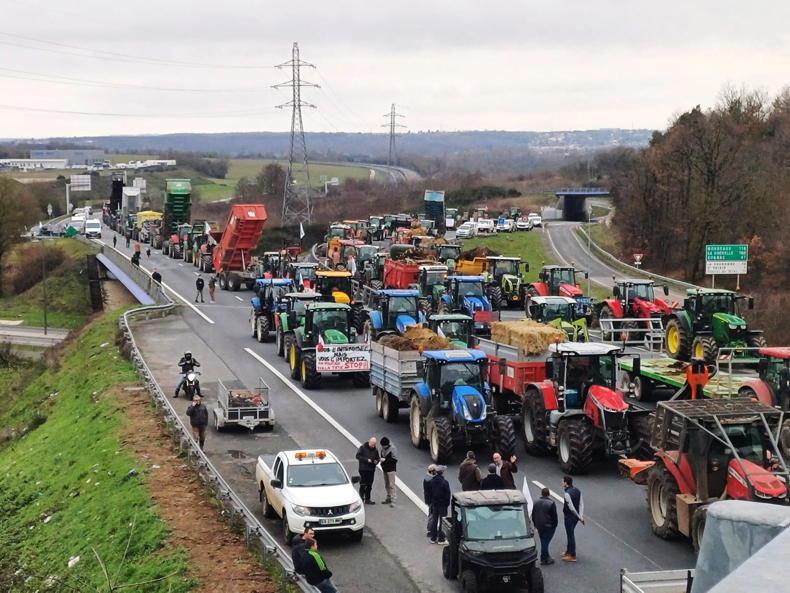
Roads blocked by French farmers over the weekend. \ Source: X
The Young Farmers Union (JA) and the National Federation of Agricultural Operators’ Unions (La FNSEA), described this as “tangible progress”.
La FNSEA president Arnuad Rousseau said Europe needs to recognise that food production, food sovereignty and income are intangible elements of farmers’ businesses.
“Our agriculture, our common fight, is closely linked to what is happening in Europe,” he said.
The French government announced its first set of concessions to farmers in the form of scrapping the tax on green diesel, reducing bureaucracy and quicker payment of CAP funds.
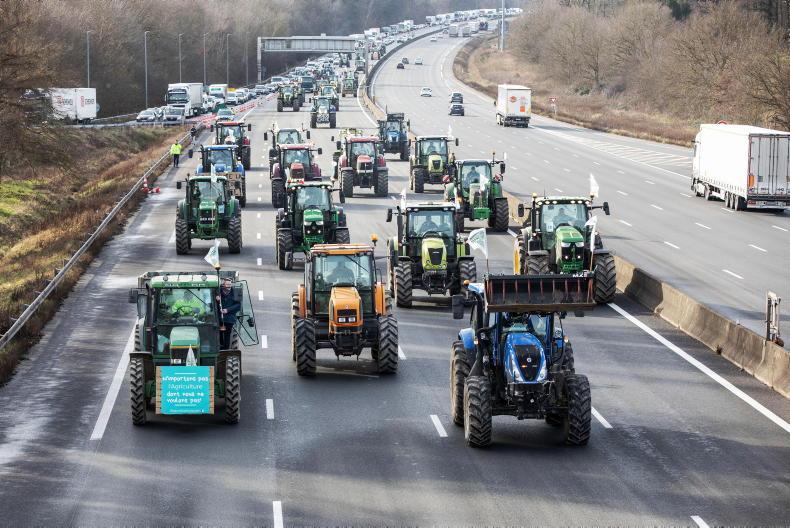
French farmers block the A10 highway, in France. \ Francois Loock/Alamy Live News
In the protest, which intensified on Monday 29 January with a “siege” of Paris, French farmers blocked key roads with tractors, sprayed manure on public buildings, dumped rotting produce and covered roads with soil.
La FNSEA detailed its reasons to protest as: inconsistencies in regulations, the need for fair renumeration and reestablishing fair conditions of practice.
The Mercosur trade deal and imports from Ukraine were highlighted by French farmers as key issues.
Poland: farmers blockade border
Last week saw Polish farming organisations and farmers affiliated with the workers’ union Solidarity blockade a crossing at the Poland-Ukraine border in protest over high levels of agri-food imports from Ukraine since import quotas and tariffs from the war-torn country were removed.
Farmers in Poland and other EU member states which border Ukraine have been protesting over the influx of grain from the country on to their markets since the beginning of 2023, saying that it is undercutting local prices and that imported goods standards do not meet those which are required from farmers in the EU.
Border crossings
Following these protests, Solidarity voted to commence a one-month campaign to blockade “all border crossings between Poland and Ukraine, along with blockades of roads and motorways” this Friday 9 February.
Aside from Ukrainian imports, Polish farmers’ reasons for protesting echo other western member states, such as Green Deal regulations, an unworkable CAP and poor farm profitability.
Farmer concern also focused on the European Commission’s proposed sustainable use of pesticides regulation, a central pillar of the Farm to Fork initiative, which would have forced a 50% pesticide cut on the country’s large tillage sector to be achieved by 2030. The future of the proposed regulation had been unclear since late 2023 when it was rejected outright by the European Parliament.
‘Symbol of polarisation’
However, on Monday, after the week of protests, European Commission president Ursula von der Leyen signalled the scrapping of the regulation, referring to the proposal as a “symbol of polarisation” between farming and environmental interests.
Belgium:
protest in
Brussels
Members of Belgium’s two largest farming organisations – Boerenbond in Flanders and the FWA in Wallonia – were among those who took protests right to the heart of Brussels’ EU quarter last week.
Protests came to a head when an estimated 1,300 tractors blocked roads in the city centre on Wednesday and Thursday, with demonstrations centred outside the European Parliament building.
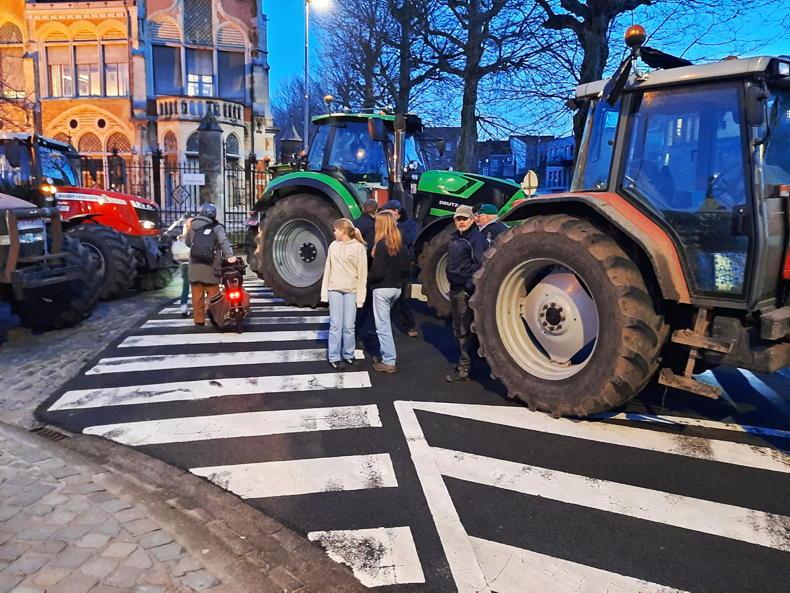
Farmers protest in Ghent, Belgium, against the impact of EU regulations on their incomes. \ Jack Kennedy
On Wednesday, the Commission announced that it would propose a one-year derogation from the CAP payment requirement to leave 4% of land as a non-productive area, such as leaving this land fallow or as space for nature.
Belgian farming organisations, as well as EU umbrella farming group Copa, met the Belgian and Dutch prime ministers and Commission president Ursula von der Leyen as protests were still ongoing on Thursday.
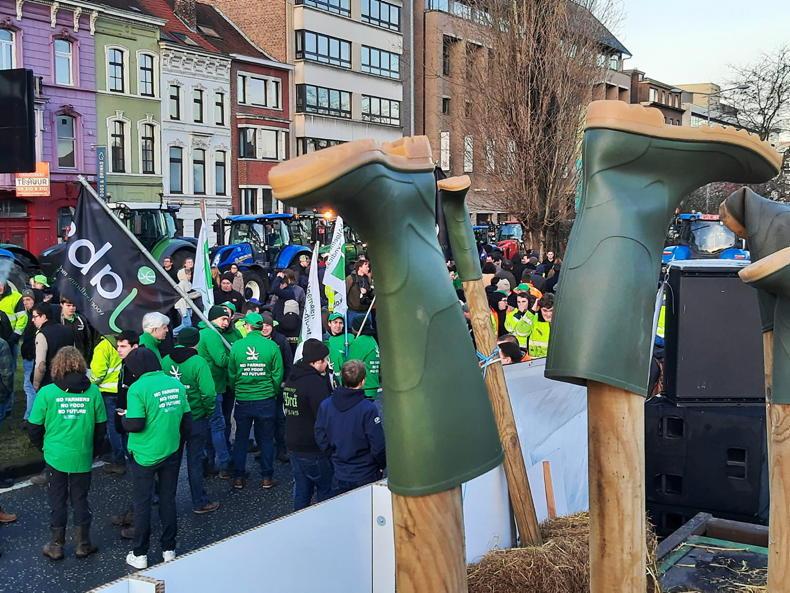
Farmers protest in Ghent, Belgium, against the impact of EU regulations on their incomes. \ Jack Kennedy
After this meeting, von der Leyen indicated that a proposal would be brought forward on simplifying the administrative burden placed on farmers.
Boerenbond met with its local Flemish government on Friday and claimed to have had its “first constructive conversation” with representatives on their concerns.
These concerns mainly relate to excessive regulation, calendar-based farming rules, lagging farm incomes and nitrates restrictions, and are similar to those cited by the FWA in Wallonia.
When calling on farmers to take to the streets last week, the FWA stated that farmers were being “crushed by a legislative steamroller, an administrative overload, an agriculture based on dates and an income always at half-mast”.
Ireland: show of solidarity
The IFA held a nationwide protest on Thursday of last week, as thousands of farmers took to the streets in solidarity with their EU counterparts.
IFA president Francie Gorman said that there will have to be a fundamental reset in the way that farm policy is designed and implemented.
“Time and again, we have seen a level of complexity introduced that does not take account of the practicalities of day-to-day farming.
“One example would be the failure to pay farmers who are doing excellent work for the environment through ACRES. It’s simply not good enough and shows a lack of understanding of how these schemes work and deliver for farmers,” he said.
The French-farmer siege of Paris ended late last week, with farmers achieving key concessions from the French government on several farming issues.
The French prime minister scrapped plans to increase the tax on green diesel, promised better import controls and vowed to accelerate CAP payments to farmers.
The European Commission also moved, introducing a one-year derogation to the rules around fallow land.
The protests across France were one of hundreds that took place across the EU in recent weeks and months.
Farmers blocked key arteries across Europe to protest against the over-regulation of their sector, Ukrainian imports, red tape and taxes, among other more regional issues.
The protest action has taken place from one end of the EU to the other – from Ireland to Bulgaria.
Ban
Protests continue to take place in Latvia this week, with thousands calling for a ban on Russian and Belarusian imports into the EU, and in Bulgaria, Greece and Spain.
Germany:
Berlin at a standstill
Germany was the first EU country to stage large-scale farmer protests this year. For a week at the beginning of January, German farmers brought roads and cities, including central Berlin, to a standstill.
The protests were primarily organised by Deutscher Bauernverband, the German farmers’ association (DBV).
The DBV explained to the Irish Farmers Journal that the trigger for the recent protests was the coalition government’s budget for 2024, which cut green diesel subsidies and tax breaks for agricultural vehicles.
“These two measures alone would have meant an additional burden of around €920m per year for agricultural businesses in Germany.
“A tax increase of this magnitude for a single sector is unprecedented and disproportionate.
“In addition, the agricultural sector has already had to accept severe cuts, thereby contributing to budget consolidation.
“The above-mentioned political decisions – combined with a general feeling of low esteem and appreciation, a lack of planning security, ever more regulations and excessive bureaucracy – led to the current farmers’ protests in Germany,” the DBV said.
The Government’s planned phasing out of the tax exemption for agricultural vehicles was cancelled on foot of the protests, which the DBV said “is a step in the right direction”.
“However, a viable solution for agricultural diesel has still not been found.
“Last week, the federal states decided to put the brakes on the federal government’s budget law.
“The time gained must now be used sensibly.
“Solutions must be found in the interests of agriculture.
“The tax increase on agricultural diesel must be taken off the table,” the DVB said.
France: the siege of Paris
Last Thursday it was announced by French farm organisations that the country’s latest farmer protests would be suspended.
This came as prime minister Gabriel Attal announced a new suite of measures, which included better control on imports and increased aid to farmers.
Among the measures, the government agreed that there would be no new ban on pesticides without a solution and an immediate ban on fruit and vegetable imports from outside the EU treated with thiacloprid – which is banned in the bloc.

Roads blocked by French farmers over the weekend. \ Source: X
The Young Farmers Union (JA) and the National Federation of Agricultural Operators’ Unions (La FNSEA), described this as “tangible progress”.
La FNSEA president Arnuad Rousseau said Europe needs to recognise that food production, food sovereignty and income are intangible elements of farmers’ businesses.
“Our agriculture, our common fight, is closely linked to what is happening in Europe,” he said.
The French government announced its first set of concessions to farmers in the form of scrapping the tax on green diesel, reducing bureaucracy and quicker payment of CAP funds.

French farmers block the A10 highway, in France. \ Francois Loock/Alamy Live News
In the protest, which intensified on Monday 29 January with a “siege” of Paris, French farmers blocked key roads with tractors, sprayed manure on public buildings, dumped rotting produce and covered roads with soil.
La FNSEA detailed its reasons to protest as: inconsistencies in regulations, the need for fair renumeration and reestablishing fair conditions of practice.
The Mercosur trade deal and imports from Ukraine were highlighted by French farmers as key issues.
Poland: farmers blockade border
Last week saw Polish farming organisations and farmers affiliated with the workers’ union Solidarity blockade a crossing at the Poland-Ukraine border in protest over high levels of agri-food imports from Ukraine since import quotas and tariffs from the war-torn country were removed.
Farmers in Poland and other EU member states which border Ukraine have been protesting over the influx of grain from the country on to their markets since the beginning of 2023, saying that it is undercutting local prices and that imported goods standards do not meet those which are required from farmers in the EU.
Border crossings
Following these protests, Solidarity voted to commence a one-month campaign to blockade “all border crossings between Poland and Ukraine, along with blockades of roads and motorways” this Friday 9 February.
Aside from Ukrainian imports, Polish farmers’ reasons for protesting echo other western member states, such as Green Deal regulations, an unworkable CAP and poor farm profitability.
Farmer concern also focused on the European Commission’s proposed sustainable use of pesticides regulation, a central pillar of the Farm to Fork initiative, which would have forced a 50% pesticide cut on the country’s large tillage sector to be achieved by 2030. The future of the proposed regulation had been unclear since late 2023 when it was rejected outright by the European Parliament.
‘Symbol of polarisation’
However, on Monday, after the week of protests, European Commission president Ursula von der Leyen signalled the scrapping of the regulation, referring to the proposal as a “symbol of polarisation” between farming and environmental interests.
Belgium:
protest in
Brussels
Members of Belgium’s two largest farming organisations – Boerenbond in Flanders and the FWA in Wallonia – were among those who took protests right to the heart of Brussels’ EU quarter last week.
Protests came to a head when an estimated 1,300 tractors blocked roads in the city centre on Wednesday and Thursday, with demonstrations centred outside the European Parliament building.

Farmers protest in Ghent, Belgium, against the impact of EU regulations on their incomes. \ Jack Kennedy
On Wednesday, the Commission announced that it would propose a one-year derogation from the CAP payment requirement to leave 4% of land as a non-productive area, such as leaving this land fallow or as space for nature.
Belgian farming organisations, as well as EU umbrella farming group Copa, met the Belgian and Dutch prime ministers and Commission president Ursula von der Leyen as protests were still ongoing on Thursday.

Farmers protest in Ghent, Belgium, against the impact of EU regulations on their incomes. \ Jack Kennedy
After this meeting, von der Leyen indicated that a proposal would be brought forward on simplifying the administrative burden placed on farmers.
Boerenbond met with its local Flemish government on Friday and claimed to have had its “first constructive conversation” with representatives on their concerns.
These concerns mainly relate to excessive regulation, calendar-based farming rules, lagging farm incomes and nitrates restrictions, and are similar to those cited by the FWA in Wallonia.
When calling on farmers to take to the streets last week, the FWA stated that farmers were being “crushed by a legislative steamroller, an administrative overload, an agriculture based on dates and an income always at half-mast”.
Ireland: show of solidarity
The IFA held a nationwide protest on Thursday of last week, as thousands of farmers took to the streets in solidarity with their EU counterparts.
IFA president Francie Gorman said that there will have to be a fundamental reset in the way that farm policy is designed and implemented.
“Time and again, we have seen a level of complexity introduced that does not take account of the practicalities of day-to-day farming.
“One example would be the failure to pay farmers who are doing excellent work for the environment through ACRES. It’s simply not good enough and shows a lack of understanding of how these schemes work and deliver for farmers,” he said.










 This is a subscriber-only article
This is a subscriber-only article







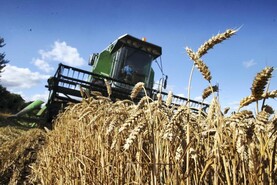


SHARING OPTIONS: